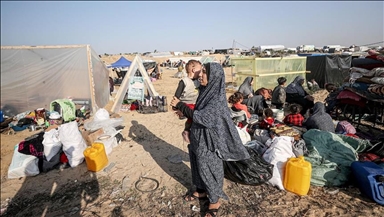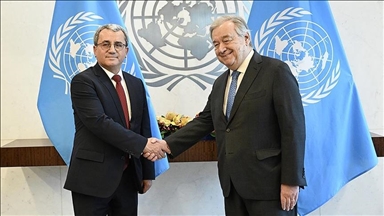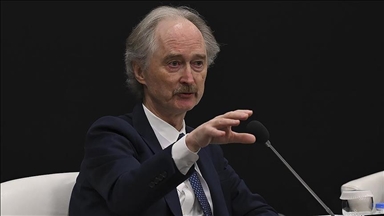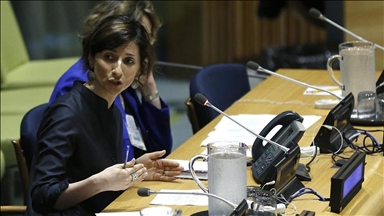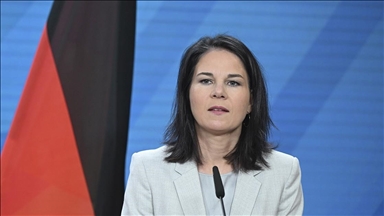UN: Ban urges governments to act on climate change
President Recep Tayyip Erdogan's tells U.N. Climate Change Summit any agreement must have flexibility
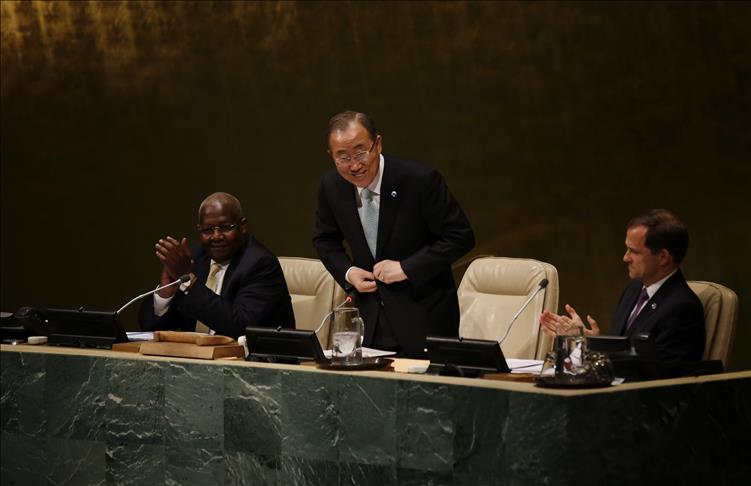
UNITED NATIONS
The United Nations Secretary-General has called on governments to do their part in tackling global climate change.
Ban told more than 120 world leaders at a meeting in New York for talks aimed at agreeing a new global climate treaty by the end of 2015 that global warming was becoming "unbearable".
He told delegates at the UN Climate Change Summit on Tuesday: "Climate change threatens hard-won peace, prosperity and opportunity for billions of people."
He said the world had never faced such a challenge, adding: "The human, environmental and financial cost of climate change is fast becoming unbearable."
'Existential threat'
Ban asked all governments to commit to a meaningful, universal climate agreement in Paris in 2015, and to do their fair share to limit global temperature rise to less than two degrees Celsius.
He said: "We must cut emissions. By the end of this century we must be carbon neutral. We must not emit more carbon than our planet can absorb.
"To do that, we must work together to mobilise money and move markets. No one is immune from climate change."
Meanwhile, Mayor of New York City Bill de Blasio told the summit: “We know humanity is facing an existential threat."
Climate deal must consider economic realities: Erdogan
In a speech at the U.N. Climate Change Summit in New York on Tuesday, Erdogan said Turkey was “ready to do its part” in the fight against global warming.
Economic realities must be taken into account in any global agreement on tackling ever-threatening climate change, Turkey’s President Recep Tayyip Erdogan has said.
He said: "A new binding agreement should include certain flexibilities for countries, within the scope of ‘common but differentiated responsibilities’ and ‘relative capabilities’."
The president also emphasized that the rights of the least-developed countries should be protected in creating new policies, as they are not the cause of climate change, but the most-affected by its results.
“Developed countries should assume more responsibility in the fight with climate change, with regard to reducing carbon emissions and financial and technological support,” Erdogan added.
'Comprehensive projects'
The current climate change summit is to shape next year’s Paris conference, which has been billed as the most important climate change meeting since Kyoto in 1997.
The treaty is expected to include new measures to limit the rise in global warming.
Mentioning Turkey's individual contributions in the fight against climate change, Erdogan said Turkey had reduced its carbon emissions by 21 per cent between 1990 and 2012.
“This figure excludes Turkey’s comprehensive projects on forests,” Erdogan said.
Erdogan said Turkey is continuing its efforts within the scope of the 2011-2023 Climate Change Action Plan, aimed at increasing the share of renewable energy in total energy production to 30 per cent, and decreasing the size of energy in the economy by 20 per cent.
Latin leaders call for action at UN Climate Summit
Prominent South American leaders addressed the United Nations Climate Summit in New York on Tuesday, including the presidents of Brazil and Peru, whose actions to preserve the Amazon rainforest have been the focus of mounting scrutiny.
More than 120 world leaders attended the summit to galvanize support among member states for a comprehensive new global climate agreement to be negotiated in Paris in 2015.
The countries are also exchanging experience on steps they have taken to help reduce climate change.
"Our determination in tackling climate change is not limited to Brazil's Amazon region. We are cooperating with all Amazon Basin countries to monitor and combat deforestation," Brazilian President Dilma Rousseff told the summit
Rousseff was one of 41 leaders to take the podium where she also highlighted the need to reduce deforestation in other areas, including the Congo Basin, and reiterated calls for a "universal, ambitious and legally-binding" climate deal.
Brazil has vowed to submit a national climate adaptation plan in 2015, and also highlighted the need to support developing countries' efforts to tackle climate change.
"We shall not give up the imperative task of reducing inequality," Rousseff said. "Developing countries have an equal right to well-being."
Brazil is ranked 13th globally in terms of CO2 emissions, according to the U.S. Energy Information Administration.
As the incumbent Brazilian leader, Rousseff will also give the opening speech at Wednesday's 69th United Nations General Assembly, as tradition dictates.
Peru 'mega-conference'
Another of the 41 heads of state set to address the summit was Peruvian president Ollanta Humala who said his country had pledged to turn a new chapter in its fight against deforestation. Peru's share of the Amazonian rainforest is the second-largest after Brazil.
The commitment comes after the country recently announced the creation of a new commission to address illegal logging and mining in the region.
Humala said any new agreement between the countries must be fair, balanced, recognize historical responsibility, and allow for economic growth while combatting poverty.
The Peruvian capital of Lima is hosting the next major meeting of the U.N. climate negotiations in December. The "mega-conference" is expected to draw 12,000 political, business and social representatives and will make "great progress" towards a universal climate deal, Humala said.
Venezuelan President Nicolás Maduro, the leader of another of the nine countries to share the Amazon Basin, used his speech to blame capitalist countries for "ignoring" climate change and urged countries to change economic models to halt climate change, preserve the environment and safeguard the planet for future generations.
"Listen to the streets: they demand actions not words," Maduro said.
Chile 'vulnerable'
Chilean President Michelle Bachelet pledged 45 percent of the country's energy would be green by 2025 and used her speech to draw attention to her Andean nation’s "vulnerability" to climate change.
Glaciers in the Andes mountain ranges of Peru and Chile are threatened and have retreated in recent years, environmentalists warn.
Bachelet cited steps taken by Chile to reduce its greenhouse emissions, including a 20 percent reduction in CO2 by 2020 and a plan to recover 247,000 acres (100,000 hectares) of degraded soil to regenerate vast areas of native forest.
It is expected that a new agreement on deforestation will be unveiled at the summit, but Brazil, a key player that is home to half of the remaining tropical forests in the world, has expressed discontent over being left out of preliminary discussions.
Brazilian Environment Minister Izabella Teixeira said the country had not been invited to engage in preparations for the document, which "did not make sense," and local media said Brazil would not endorse the agreement.
The U.N. said Brazil had been approached but that no response had been forthcoming.
Brazil has already promised an 80 percent reduction in deforestation in its Amazon region by 2020, but despite making progress in combating gangs at the heart of illegal logging, Brazil recently confirmed that the rate had increased 29 percent in the 12 months to July 2013, following years of decline.
Tuesday's summit is the first high-level meeting since the 2009 Copenhagen summit, which was widely criticized for failing to deliver a climate deal.
Cities across the globe took part in a day of action on climate change Sunday, including marches attended by hundreds of thousands of people in New York, Rio de Janeiro, Bogotá, London and Paris.
Anadolu Agency website contains only a portion of the news stories offered to subscribers in the AA News Broadcasting System (HAS), and in summarized form. Please contact us for subscription options.


